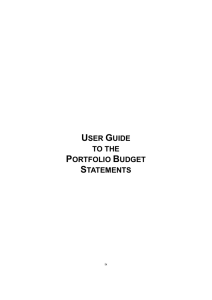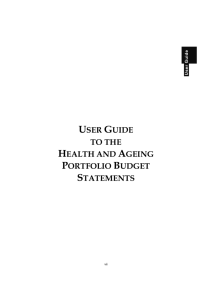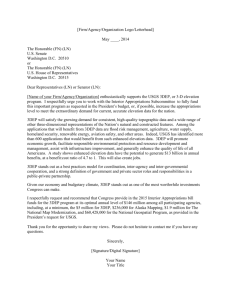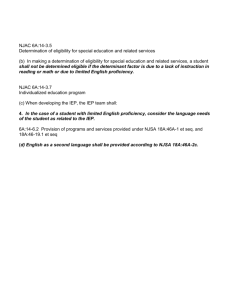Financial Reports
advertisement
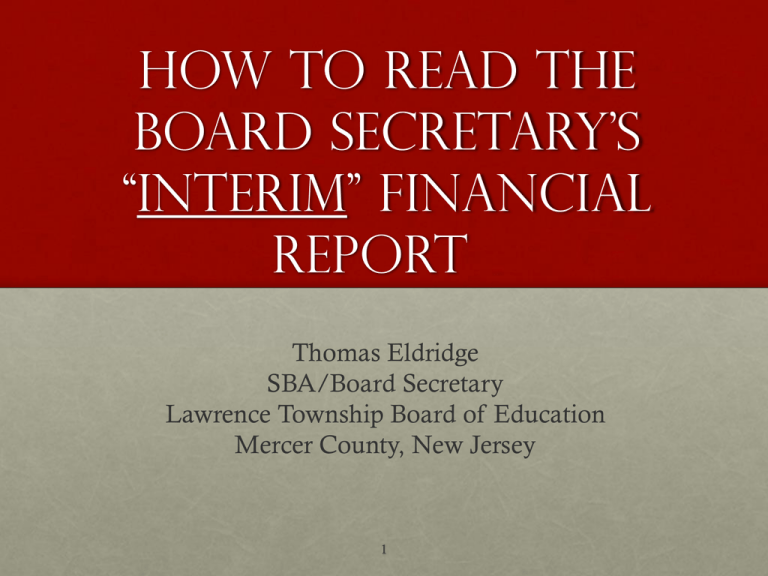
How to Read The Board Secretary’s “Interim” Financial Report Thomas Eldridge SBA/Board Secretary Lawrence Township Board of Education Mercer County, New Jersey 1 Why The report doesn’t seem to make sense! • Why does excess revenue show as a negative? Isn’t excess revenue a good thing? • Why do we show Resources as assets….when they are not yet earned? • What about the rest of the assets? Or long term liabilities? • What about the things we learned in school: • Current ratio? • Return on Assets? • Return on Equity? • A small retained earnings, i.e. fund balance is better; Why ? 2 Goals for today • Understand how to read the Board Secretary’s Report. • Understand how to use the Board Secretary’s Report as: • Managerial tool • Protection through disclosure • Talking points between you and your board. 3 Goal of Financial Reporting • Agency Problem-Without standard reporting, we have the ability to present information in a light that is most favorable to us. Not a good thing. Why is this possible….. • Information Asymmetry-A political problem. It is necessary to put into a standard format that which you already know so that users of information can make independent judgements about your work. Why? And Who uses this report? 4 What is the Board Secretary’s Report? N.J.S.A. 18A:17-9 Defined: Also Require by 6A:23A-16.2 Principles and directives for accounting and reporting • Total appropriations • Total amount of orders charged against each appropriation account • Total amount of warrants(checks) issued for each account, (18A:19-1) who signs them, and (18A:19-2) when they can be paid and by whom. • Total cash receipts • Cash and appropriation balances • Reconciled bank account balances (Treasurer’s Report) Not done yet……also look to 6A:23A-16.10( c) Why? What do we do with this information? 5 What does the Report tell the information user? Manage Resources to Achieve Goals • Total appropriations • Total amount of orders charged against each account • Total amount of warrants issued for each account • Total cash receipts • Cash and appropriation balances • Reconciled bank account balances 6 Spending plan & status of plan How much we have contracted for through PO’s and Payroll How much we have paid(Bills List) Who funds the budget? What funds have been received? Cash balances and how much is left in the spending plan available for use Treasurer’s Report How do I find this information? The Report as a managerial tool to manage resources: Does my cash reconcile? Do I have enough cash to pay the bills? Funds 10, 20?, 30?, 40? Can I make an inter-fund loan? If so, How do I track it? How do I make sure my Reserve Liabilities reconcile to my Reserve allocated cash? How do I proof my Accounts Receivable? What happens if I don’t regularly prove my Accounts Receivable? Can the report tell me if I made an Accounting Entry/Journal Error? Is there a way to make absolutely sure my A/P is accurate at a glance? Did Transportation Department and Student Services Department encumber their respective contracts? (Routes & Tuition) I don’t have time to communicate….but I’ll be in trouble if I don’t…..How do I communicate financial information to my Board/Superintendent? 7 Focus on The Report…..twice a month(QSAC)… The report •Understand •Use it for your needs 8 Demystifying the Report: The format Balance Sheet SUMMARY LEVEL DETAIL LEVEL RESOURCES: -Cash -Acct. Rec. -Revenue Summary Revenue Detail Report = LIABILITIES: -Accts. Pay. -Reserves -Appropriations Summary -Fund Balance Appropriation Detail Report Let’s start with what we know and keep touching base as we go. What we know….. 9 Appropriations Objectives: Apply, Control, Comply 1. Original Budget Appropriations 2. Transfers between appropriations 3. Adjusted Budget Appropriations 4. Orders a. b. Expenditures (18A:19-1)….signatures, etc. Encumbrances 5. Funds Available 6. Answer the questions: a. b. What happens to Funds Available? Do we have enough resources to accomplish the spending plan? 10 Budgeted Appropriations 1. Budgeted Appropriations are a spending plan approved by the BOE during budget development 2. Appropriations are matched by Budgeted Revenue and Budgeted Fund Balance 3. “Budget” means estimate….18 months before final expenditure. 4. Budgeted Appropriations change and become “Adjusted Appropriations.” How do they change? Who can change them? 5. BOE certifies every month that there have been no “overexpenditures” and that there are “Sufficient funds”. NJAC 6A:23A-16.10c(3) Budgetary Controls, which refers to 18A:22-8 for the detail to which the certification applies. NJAC 6A:23A16.10c(3) refers to the “Minimum Chart of Accounts.” 11 Where do I find the Appropriations? Objective #1. Original Budget: Found in the Board Secretary’s Report (monthly) Your spending plan = program(s)=Board goals/objectives How much did we budget for……? Where did this number come from? How often do you proof it? What is a better number to use for your Appropriations proof12? Proofing Original Appropriations 13 Prove original to Final doe Budget PROOFING THE BOARD SECRETARY'S REPORT 19 LIABILITIES 20 400's Accounts Payable are documented and itemized 21 Interfunds Payable have corresponding Interfund Receivable in other funds 22 601 Appropriations "601" = Final DOE Budget 23 24 Less: (DOE) Budgeted Increase in Capital Reserve (shown in DOE budget-NonGAAP) Appropriations "601" = Original Appropriations 14 2015/2016 Yes NA $ $ 68,497,899.00 $ (1,600,000.00) $ 66,897,899.00 Quick check: Original Budget • What is the original budget? • What should the Board Secretary’s Report “Original Budget” equal? • Who approved the “Original Budget?” • I should always prove that the Board Secretary’s “Original Budget” is correct by comparing it to: • A. Power Points posted on the website • B. Budget Brochures • C. The final DOE Approved Budget • Where can I find the Total Original General Operating Fund Budget within the Board Secretary’s Report? 15 How do we typically change the budget? Monthly certification 6A:23A-16.10 Budgetary controls and overexpenditure of funds (a) A district board of education or charter school board of trustees shall implement controls over budgeted revenues and appropriations as follows: 1. A district board of education or charter school board of trustees shall only approve an encumbrance or expenditure (liability or payment) that, when added to the total of existing encumbrances and expenditures, does not exceed the amount appropriated by the district board of education or charter school board of trustees in the applicable line item account established pursuant to the minimum chart of accounts referenced in N.J.A.C. 6A:23-2.2(g)1. (c) 3. A district board of education or charter school board of trustees shall obtain a certification from the school business administrator/board secretary each month that the total of encumbrances and expenditures for each line item account do not exceed the line item appropriation in violation of (a) above. What practical thing do you need to do to make this 16 true? ………….TRANSFERS Transfers: Statute 18A:22-8.1 Transfer of funds, conditions. 2.Except as otherwise provided pursuant to this section, whenever a school district desires to transfer amounts among line items and program categories, the transfers shall be by resolution of the board of education approved by a two-thirds affirmative vote of the authorized membership of the board; however, a board may, by resolution, designate the chief school administrator to approve such transfers as are necessary between meetings of the board. Transfers approved by the chief school administrator shall be reported to the board, ratified and duly recorded in the minutes at a subsequent meeting of the board, but not less than monthly. 17 Objective #2. Transfers Report (Found on the agenda) 18A:22-8.1(8.3), 6A:23A-13.3, 6A:23A-16.10, 6A:23A-14.1 (CAP. RES.) 1. Transfers are changes to the spending plan: a. b. Changes due to estimates Changes due to needs 2. Transfers are BOE approved on the agenda each month, 2/3 majority vote. 18A:22-8.1 3. Transfers occur between meetings with the superintendent’s approval. 18A:22-8.1 4. Restrictions: 10% Rule, Surplus 1. 2. 3. 5. What is an account? 6A:23A-13.3(a) What is the “From” rule? 6A:23A-13.3 (f) What is the “To” rule? 6A:23A-13.3(g) Others: Reserve(s), Unbudgeted Revenue, Prohibitions… 18 What do transfers look like? Objective #2. Transfers List BOE approved as “SBM-2” on the 6/11/12 Agenda 6A:23A-13.3 (a) All transfers shall be executed only by district board of education resolution approved in accordance with law and regulation applicable to the particular circumstances and each resolution shall indicate the exact amount of the transfers to and from the applicable accounts or fund balance 6A:23A-16.10( c) district board of education or charter school board of trustees shall ensure the following occurs at every regular district board of education or charter school board of trustees meeting: 1. The school business administrator/board secretary shall present to the district board of education or charter school board of trustees a report showing all transfers between line item accounts as well as appropriations, adjustments to appropriations, encumbrances and expenditures for each line item account shown on the budget form prepared in accordance with N.J.S.A. 18A:22-8. This report is in addition to the report required by N.J.S.A. 18A:17-9 (Board Secretary’s Report) 19 Where do we find the effects of Transfers? Objective #2 & #3 Transfers….to Adjusted Budget Increases and Decreases per line This shows the reason from the “Transfers List” Total amount of transfers in/out to-date. 20 Result: Adjusted Budget...No Over-expenditures! Quick check • What is a good reason for a transfer to occur? • • • • A. Unforeseen circumstance B. Incorrect budget estimate C. Starting a new program D. A & B • Who approves a transfer? • Restrictions: 10%, Surplus, Capital Outlay How do we see the effect of a transfer? 21 Objective #3. Adjusted Budget = (Original budget) +/- (Transfers + Prior Yr. Encumbrances “PO’s”)= Adjusted Budget How do we prove to the Adjusted Budget? What two total numbers must agree? 22 So what do we know about our budget so far ? Prove original and Adjusted to Final doe Budget PROOFING THE BOARD SECRETARY'S REPORT 19 LIABILITIES 20 400's Accounts Payable are documented and itemized 21 Interfunds Payable have corresponding Interfund Receivable in other funds 22 601 Appropriations "601" = Final DOE Budget 23 Less: (DOE) Budgeted Increase in Capital Reserve (shown in DOE budget-NonGAAP) 24 Appropriations "601" = Original Appropriations 25 Add: Prior Year Encumbrances 26 Add: Appropriation from Capital Reserve for BF Chimney 27 Add: Appropriation from Capital Reserve for Turf Project 28 This should be your new "601" under the "Adjusted Budget" 23 2015/2016 Yes NA Yes $ $ $ $ $ $ $ $ 68,497,899.00 (1,600,000.00) 66,897,899.00 2,304,843.05 14,588.00 3,600,000.00 72,817,330.05 Adjusted Appropriations agree with what? 24 Quick Check: Adjusted Budget • The Original Budget is the final budget and cannot be changed. • True or False • How do we calculate the Adjusted Budget: A. Original budget +/- Transfers + Prior Yr. PO’s= Adjusted budget B. Original budget +/- Transfers = Adjusted budget C. Original budget never changes • What is the total amount of the Adjusted Budget? • In what two places can you find the total “Adjusted Budget”, i.e. revised appropriation? 25 Ok, We know the plan. What has been spent ? Objective #4. “Orders” & Encumbrances, N.J.S.A. 18A:19-2: Bean Theory…..and bean counting Adjusted Budget – “Orders” = Funds Available AN OPPORTUNITY FOR INTERNAL CONTROLS! -18A:18A Who signs -LFN 2015-20 BA’s Threshold -Encumbrances…no confirming orders! -Who reviews Aggregates? -Who tracks Compliance -6A:23A-6.5 Segregation of duties 26 NJSA18A:18A, NJAC 6A:23A-22.14, NJAC 5:30, NJAC 5:34 Objective #4. “Orders” & Expenditures, N.J.S.A. 18A:19-2 Payments of Claims…..Bills list…. AN OPPORTUNITY FOR INTERNAL CONTROLS! PAYMENTS/EXPENDITURES: -18A:19-1 Who signs -18A:19-2 Who pays -18A:19-4.1 SBA…..Alone -18A:19-3 Affidavit 27 -Does the Board have a part in “Expenditures”? (on bills list-Typically “SBM-1”) Orders proof Adjusted Budget – “Orders” = Funds Available 28 Tie In: Budget to Balance Sheet CASH 29 What happens to unspent Fund Available? Reserve for Encumbrance 2. Reserve For Encumbrance Increases your “Non-owned” Liability, think of it as a pre“Accounts Payable” liability. 1. Encumbrance lowers your “owned” Liability CASH 30 rEVIEW 31 Review of Appropriations • Original Budget • Transfers • Adjusted Budget • Orders-Encumbrance-Expenditure • Funds Available • What is important about know these functions? 32 Fund Balance From Audit From Final Budget PROOFING THE BOARD SECRETARY'S REPORT 43 770 Fund Balance, July 1 equals audit 44 771 Reserved Fund Balance 45 303 Budgeted fund balance equals amount approved by BOE at budget time plus transfers 47 Closing entry for Excess interest to Capital Reserve (year end) 48 Undesignated and Reserved together 33 2015/2016 10 Yes NA Yes NA Yes $ $ $ $ $ 10 3,812,383.87 (2,066,210.00) 1,746,173.87 Revenue Objective: Understand 1. Original Budgeted Revenues 2. Adjusted Budgeted Revenues 3. Actual Revenues, Receipts, Receivable 4. Unrealized Revenue 5. Answer the questions: a. b. c. What happens to excess revenue? How much revenue will we collect? How much revenue have we collected? 34 Objective #1. Budgeted Revenue 1. Budgeted revenue, along with surplus, is used as resource to fund the spending plan (Appropriations) 2. “Budget” means estimate 3. “Budget” does not mean we already have the cash. 4. We are paid the cash that matches the Budgeted Revenue in installments throughout the year. 5. Our revenue is primarily funded through property taxes (Ad Valorem taxes) and state aid. Where do I find the Revenue Schedule? 35 Objective #1. Budgeted Revenue: How to use the Schedule REVENUES=APPROPRIATIONS-BUDGETED FUND BALANCE 36 Is this important? Next: Where else can we find this? What does this tie into? Assets Side CASH +FICA 37 Difference between 301 and 302 Why does this show on the Assets Side?............What if it didn’t? Why does this turn negative when38we have “over-realized” revenue? Proof of Revenue & Receivables PROOFING THE BOARD SECRETARY'S REPORT Note 2: Receivables Proof Enter 141 Less: From Rev. Schedule: Parcc Aid Growth Aid Transportation Aid Extraordinary Aid Sp. Ed. Aid Cat. Sec. Aid Sup. Trans Aid Total Aid A/R Is this FICA A/R? $3,109,339.00 40,410.00 40,410.00 612,017.00 1,898,053.00 417,886.00 3,008,776.00 $100,563.00 Ok Tuition Due Final DOE Budget 39 Corresponding Payable in another Fund (Fund 20) Part III. Balance Sheet Balance Sheet RESOURCES: -Cash -Acct. Rec. SUMMARY DETAIL -Revenue Summary Revenue Detail Report 40 = LIABILITIES: -Accts. Pay. -Reserves -Appropriations Summary -Fund Balance Appropriation Detail Report The Balance Sheet: Assets =Liabilities 41 Cash should reflect the net results of Deposits(Receipts) and (Disbursements+Cash Transfers) What we learned: 1. Appropriations 2. Revenue 3. Interim Balance Sheet(Liquid Assets) • • • • Summary of Appropriations Summary of Revenue Reserve Accounts Fund Balance(Surplus) • 100% TRANSPARENT-ONLINE and COMMUNICATED TO THE BOE MONTHLY 42 What code citations govern the Board Secretary’s Report • N.J.S.A. 18A: 17-9. Secretary; report of appropriations, bank reconciliations; custodial duties, etc. • N.J.S.A. 18A: 17-10. Secretary; annual report • N.J.A.C. 6A:23A-16.10 Budgetary controls and over expenditures of funds. See old 6A:23-2.2 re: 2R2 • N.J.A.C. 6A:23A-16.10(c)(vi)”The 60 day rule” • NJQSAC! 43 Questions 44
